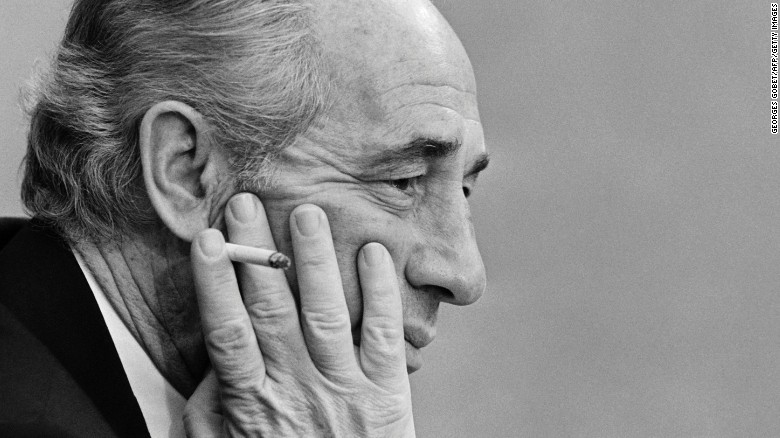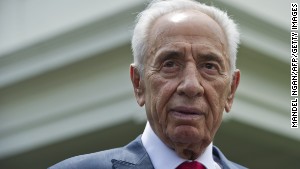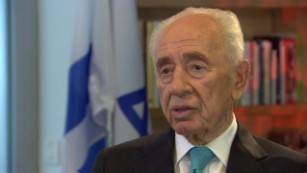Shimon Peres: Israel's warrior for peace dies
Shimon Peres, the Israeli elder statesman who shared a Nobel Prize for forging a peace deal between Israelis and Palestinians, has died. He served as a constant force for generations in Israeli politics.
The 93-year-old died after suffering a massive stroke two weeks ago. He was reported to be making progress but doctors said he took a turn for the worse Tuesday.
In top leadership roles over the decades -- including Prime Minister and President -- the Labor Party veteran became a face of the Jewish State, instantly recognized and well-respected in Israel and across the globe.
"There's no corner of this country that he hasn't touched," Zionist Union Chairman Isaac Herzog once said. "Everywhere he goes around the world, people listen to him."
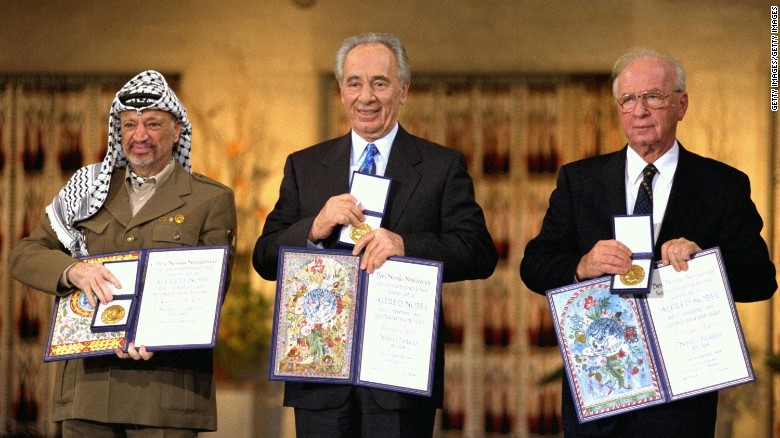
Palestinian leader Yasser Arafat (L), Israeli Foreign Minister Shimon Peres (C) and Israeli Premier Yitzhak Rabin display their Nobel Peace Prizes.
Over 50 years in politics
Peres retired from public office in 2014 after the end of his seven-year term as President. In Israeli politics for more than half a century, he held virtually every position in Cabinet, from minister of defense to Prime Minister, a position he held three times.
He battled Israeli Prime Minister Yitzhak Rabin for Labor Party leadership in the 1980s and 1990s, eventually becoming Rabin's foreign minister.
Israeli statesman Shimon Peres dies at 93
In that role, Peres concluded the Oslo Peace Accords, for which he was awarded the Nobel Peace Prize in 1994 with Rabin and Yasser Arafat.
"I am very grateful to him for a lifetime of thinking big thoughts and dreaming big dreams and figuring out practical ways to achieve them," President Bill Clinton once said of a man he considered a friend.
After Rabin was assassinated in 1995, Peres became Prime Minister, calling early elections so the government would have a mandate to pursue a two-state solution. But a wave of Palestinian suicide attacks left Peres struggling to defend the peace process, ultimately costing him the next election.
Making history
As Israel's ninth President, he addressed the Turkish parliament in 2007, becoming the first Israeli President to speak to a Muslim country's legislature. He called for peace talks in 2011 with the Palestinians and warned the United Nations against recognizing Palestine as an independent state outside a peace plan. He received the US Presidential Medal of Freedom in 2012 from President Barack Obama.
After leaving office in 2014 he remained in the public eye, continuing his work for peace in the Middle East.
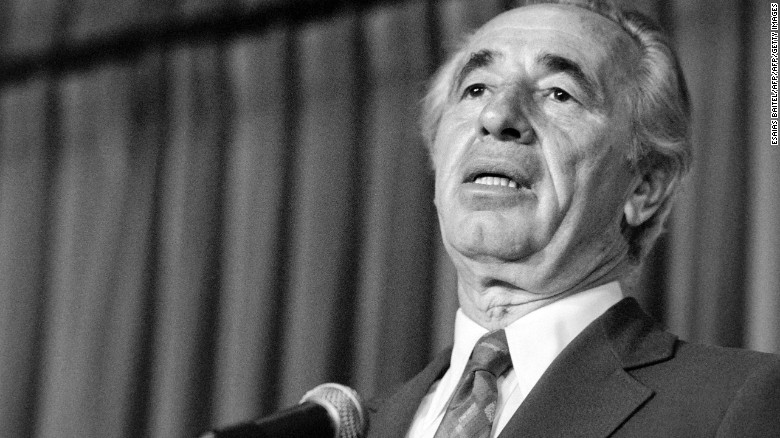
Peres was 93.
Story of modern-day Israel
Born in Wisniew, Poland, in 1923, Peres moved to British-mandate Palestine in 1932, where his story became the story of modern day Israel.
During Israel's War of Independence in 1948, he was in charge of purchasing weapons for the Israeli military. He was briefly head of the navy and helped establish the country's aircraft industry. In the 1950s, he founded the country's nuclear program, which remains shrouded in secrecy to this day. He would often refer to it as Israel's "textile industry."
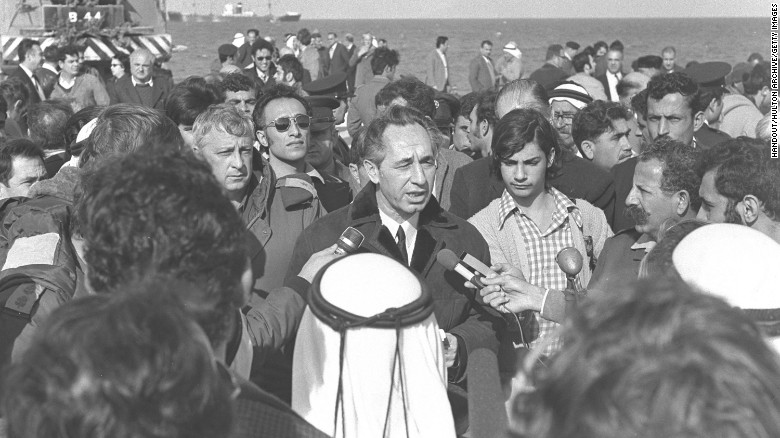
Peres held many cabinet positions, including transportation secretary.
Peres entered politics in 1959 as a member of the left-wing Mapai party, a precursor to the modern Labor party. His political career lasted more than half a century, and he held virtually every position in Israel's Cabinet.
He was Prime Minister three times, but never won an election. He became acting Prime Minister in 1977 when Yitzhak Rabin resigned following a foreign bank account scandal. He became Prime Minister again in a unity government with Yitzhak Shamir in 1984. His final term as Prime Minister came when he stepped into the premiership following the assassination of Rabin in 1995.

'He never got the public love'
Many Israelis considered him aloof -- an intellectual who wore a suit, not a uniform.
"He never got the public love that he was yearning for," said Ethan Dor Shav, an Associate Fellow at Jerusalem's Shalem Center. "He was never hugged by the populace of Israel as our leader."
When Rabin was assassinated, Peres became Prime Minister for the third and final time, calling early elections so that the government would have a mandate to pursue a two-state solution.
But a wave of Palestinian suicide bombings and other attacks tarnished his peace process.

"I know we are moving on a road full of dangers but we know also this is the right road, the best road, the only road upon which we have to move," Peres said in 1996.
Ultimately, the violence cost Peres the ensuing elections, but he never stopped believing in peace, carrying on the work of rival-turned-colleague Rabin.
"Peace is costly," Peres said in 2015 on the 20th anniversary of Rabin's assassination. "Only thing is, war costs more."
Retired, sort of
In 2007, Peres became Israel's ninth President, serving in the role until his retirement from politics in 2014 at the age of 91. He wasn't done yet. After his retirement, he devoted his time to the Peres Center for Peace, an organization that works to build better ties between Israelis and Palestinians.
"The greatness of Shimon Peres is that he is beyond age," Herzog said.

Of all the Palestinians, PLO Secretary-General Saeb Erakat may have known Peres the best.
"When I met him 25 years ago, I was a young professor," Erakat said in 2002. "I was angry about something, and he looked at me and he said, 'Saeb, negotiation in pain and frustration for five years is cheaper than exchanging bullets for five minutes.'"
Hope for children
When asked how he wanted to be remembered, Peres didn't mention a life of civil service.
"I would like that somebody would write about me that I saved the life of one single child," Peres said in 2004. "This will satisfy more than anything else."
Perhaps a better answer came a decade earlier.
"I feel like a person that has served this country rightly and properly," he said. "And that is, in my judgment, the highest degree a person can feel."
On this day, there are few Israelis who would disagree.
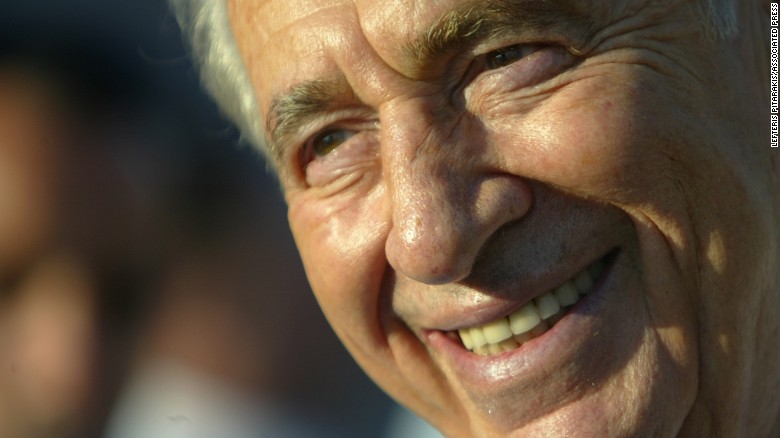
Shimon Peres died at 93
Tributes from home and abroad
"There are few people who we share this world with who change the course of human history, not just through their role in human events, but because they expand our moral imagination and force us to expect more of ourselves," U.S. President Barack Obama said in a statement from the White House. "Shimon was the essence of Israel itself."
Peres' contemporary, former US President Bill Clinton, said that "Israel has lost a leader who championed its security, prosperity, and limitless possibilities from its birth to his last day on earth."
"He was a genius with a big heart who used his gifts to imagine a future of reconciliation not conflict, economic and social empowerment not anger and frustration," Clinton added.
Prime Minister Benyamin Netanyahu released a statement expressing his sadness for the country's ninth leader.
"(Prime Minister) Benjamin Netanyahu and his wife Sara express deep personal sorrow for the passing of a man cherished by the nation, the (Former) President of Israel Shimon Peres," the statement read.
It added that the Prime Minister will deliver a special statement Wednesday morning, and will convene his cabinet for a special session of mourning.
Earlier Tuesday, a visibly shaken minister Aryeh Deri, Israel's defense minister, told reporters that he had been praying for Peres at his bedside.
Canadian Prime Minister added his voice to the tributes, calling Peres "above all, a man of peace."
News Courtesy: www.cnn.com

